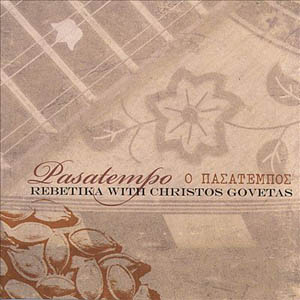 “Greek blues.” Yes, and no. While several commentators have typified rebetika that way, I don’t think that really gives a clear idea of what this music is like. Rebetika (sometimes known as “rembetika“) is a style of music that came into its own in the lower-class bars and cafes of Greece. Its ancestors appear in the urban Greek ethnic communities of Asia Minor in the late nineteenth century and spread to emigrant Greek communities worldwide, finally appearing full-blown in the cities of mainland Greece in the 1920s.
“Greek blues.” Yes, and no. While several commentators have typified rebetika that way, I don’t think that really gives a clear idea of what this music is like. Rebetika (sometimes known as “rembetika“) is a style of music that came into its own in the lower-class bars and cafes of Greece. Its ancestors appear in the urban Greek ethnic communities of Asia Minor in the late nineteenth century and spread to emigrant Greek communities worldwide, finally appearing full-blown in the cities of mainland Greece in the 1920s.
Blues is probably the closest analogue. Much of the inspiration for rebetika comes from the same places — jails, hash dens, the slums — and the themes are the same: love, heartbreak, drugs, betrayal and misfortune. Like the blues, this was a music of the lower classes, often displaced, usually unemployed, and finding their livelihoods and entertainments where they could.
It might help to explain the context of this music if we look at some of the proposed derivations of the word itself. Some say it came from the Turkish rembet, meaning “of the gutter”; or, it may derive from the Serbian rebenòk, “rebel”; the again, it may be a corruption of the verb remvo, “I wander.” There are also Persian, Arabic and even Hebrew candidates as well. It seems certain, however, that the term rebetika first appeared in the United States in the 1920s.
Although rebetika songs don’t seem to be structurally similar to blues, the big difference is in the sound. Both the Greek and Turkish sides of its heritage are obvious, in vocal styles, rhythmic patterns, and in such basics as phrasing, but one is hard put to separate the strands in what is, after all, a fully integrated style of music.
Husband and wife Christos Govetas and Ruth Hunter are well known for their performances of Greek folk music. Christos has worked with the folk groups Pangeo and Ziyia, as well as forming his own group, Taximi. Dave Bartley, who joins them on this disc, plays just about any instrument that can be plucked, and has been quite active in the contradance world, playing with KGB, Close Call and Tricky Brits, and has worked with Govetas and Hunter since the late 1990s. Their affinity for rebetika is apparent in this recording, and Hunter’s vocals, in particular, have the ring of authenticity.
(Pasatempo, 2006)
